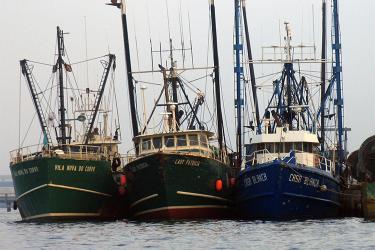Collect, Distribute, and Analyze: Our long-term ecosystem data (hydrography, ocean chemistry, plankton) and analyses feed research into everything from North Atlantic Right Whales to stock assessments.
Collaborate: We work closely with fishing industry, academic, and government (state, national, and international) partners.
Explore: Our research helps discover new ways to enhance fisheries and ecosystem management and to improve data collection and processing methods.
Over 40 Years of Ecosystem Monitoring on the Continental Shelf
Every time we go to sea, we collect an on-site, broadscale view of what is going on in our East Coast continental shelf waters.
Plankton nets, pulled through the water down to 650 feet, collect small marine animals such as fish larvae, crab larvae, copepods, and small jellyfish. Special equipment collects information on nutrients, acidity, temperature, salinity, and other parts of the marine environment. Dedicated observers count and photograph marine mammals, turtles, and seabirds seen along the cruise tracks to better understand their migrations and how they find food and habitat on their journeys.
By examining these snapshots spanning the early 1970s to present, we have collected a comprehensive set of information on the offshore ecosystem of the Northeast U.S. continental shelf and surrounding marine habitats. Without these glimpses into the environment, we wouldn't have the data to make informed decisions about how climate change is affecting our planet and what we can do to mitigate it.
Learn more about our surveys and data collection
Over 40 Years of Data Publicly Available
Our information is rigorously quality controlled and publicly available. Our hydrographic and plankton databases span over 40 years, and the spatial and temporal coverage of the data is unrivalled in the Northeast region. These data highlight changes and trends in the abundance and distribution of marine life and their habitat in our coastal and offshore waters.
The Plankton Archive includes zooplankton, larval fish, fish eggs, and cephalopods collected from the Northeast U.S. shelf and surrounding areas for over four decades.
- Contact Chris Melrose or visit the NCEI World Ocean Database for hydrographic data
- Environmental Monitors on Lobster Traps (EMOLT) data are available from the Northeast Fisheries Science Center EMOLT page
- Data from drifters, oceanographic devices that measure water properties while floating on ocean currents, are available from the Northeast Fisheries Science Center Drifter data site.
Research Informing Fisheries Management and Climate Science
These data are the basis for reports documenting the effect of a changing climate on our coastal resources. Our data provide details necessary for fisheries management. We collect temperature, salinity, and water-chemistry data year-round during most of the Center cruises. This information documents the seasonal and multiyear patterns in the water properties on the Northeast continental shelf. Our research helps explain how the ecosystem influences the distribution, abundance, and productivity of marine species, such as North Atlantic right whales, tuna, tiny planktonic krill, copepods, and fish larvae.
Personnel and Expertise
Our team of physical and biological oceanographers, taxonomists, climate scientists, fishery biologists, software engineers, and oceanographic equipment experts are led by Dr. Paula Fratantoni.







